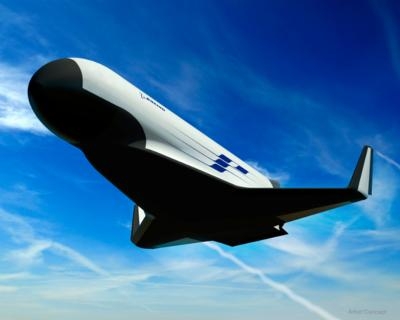Wed, Jul 16, 2014
DARPA Program Seeks To Lower Satellite Launch Costs
Boeing plans to design an autonomous reusable launch vehicle, shown here in an artist’s concept, to lower satellite launch costs under a new contract for the Defense Advanced Research Projects Agency XS-1 Experimental Spaceplane program.

The spaceplane booster would be designed to carry and deploy an upper stage to launch small satellites and payloads into low-Earth orbit and then return to Earth, where it could be quickly prepared for its next flight by applying operation and maintenance principles similar to those of modern aircraft. DARPA plans to hold a competition in 2015 for a follow-on production order to build the vehicle and conduct demonstration flights.
“Developing a vehicle that launches small payloads more affordably is a priority for future U.S. Defense Department operations,” said Steve Johnston, director of Boeing’s Phantom Works Advanced Space Exploration division. “Boeing brings a combination of proven experience in developing launch systems and reusable space vehicles, along with unparalleled expertise in the development and fielding of highly operable and cost-effective transportation systems.”
Under the $4 million preliminary design contract, Boeing plans to work on a reusable first stage launch vehicle capable of carrying and deploying an upper stage to launch small satellite payloads of 3,000 to 5,000 pounds into low-Earth orbit.
“Our design would allow the autonomous booster to carry the second stage and payload to high altitude and deploy them into space. The booster would then return to Earth, where it could be quickly prepared for the next flight by applying operation and maintenance principles similar to modern aircraft.” said Will Hampton, Boeing XS-1 program manager. “Drawing on our other innovative technologies, Boeing intends to provide a concept that uses efficient, streamlined ground infrastructure and improves the turnaround time to relaunch this spacecraft for subsequent missions.”
DARPA plans to hold a Phase II competition next year for the follow-on production order to build the vehicle and conduct demonstration flights.
(Image provided by Boeing)
More News
How To Get A Story On Aero-TV News/Feature Programming How do I submit a story idea or lead to Aero-TV? If you would like to submit a story idea or lead, please contact Jim Campbel>[...]
From 2011 (YouTube Edition): Aviation's Greatest Living Legend Talks About His Life In Aviation (Part 5, Final) ANN is pleased to offer you yet another snippet from the public conv>[...]
“All Air Traffic Controllers must get back to work, NOW!!! Anyone who doesn’t will be substantially ‘docked. For those Air Traffic Controllers who were GREAT PATR>[...]
Aero Linx: American Navion Society Welcome to the American Navion Society. Your society is here to support the Navion community. We are your source of technical and operating infor>[...]
Glideslope Intercept Altitude The published minimum altitude to intercept the glideslope in the intermediate segment of an instrument approach. Government charts use the lightning >[...]
 ANN FAQ: Contributing To Aero-TV
ANN FAQ: Contributing To Aero-TV Classic Aero-TV: Bob Hoover At Airventure -- Flight Test and Military Service
Classic Aero-TV: Bob Hoover At Airventure -- Flight Test and Military Service Aero-News: Quote of the Day (11.12.25)
Aero-News: Quote of the Day (11.12.25) ANN's Daily Aero-Linx (11.12.25)
ANN's Daily Aero-Linx (11.12.25) ANN's Daily Aero-Term (11.12.25): Glideslope Intercept Altitude
ANN's Daily Aero-Term (11.12.25): Glideslope Intercept Altitude



